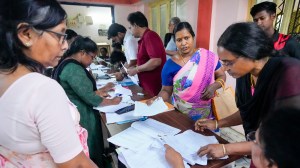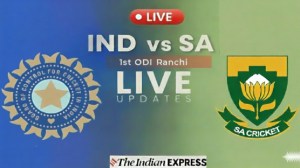Stay updated with the latest - Click here to follow us on Instagram
Despite defeat in assembly polls, NCP, Congress retain hold in cooperatives
Fadnavis government faces the challenge of bringing in reforms in the cooperative sector.
 The association of cooperatives with the Congress goes back to the 1960s. (Express Photo by Gajendra Yadav)
The association of cooperatives with the Congress goes back to the 1960s. (Express Photo by Gajendra Yadav)
Even as the BJP-Shiv Sena combine has formed the state government, the saffron alliance is yet to make a dent in the all-important cooperatives sector that continues to be dominated by the Congress and the NCP.
The change in the order in Mumbai was nowhere reflected in the elections to the district central cooperative banks (DCCBs) where the Congress and the NCP have come up trumps, renewing their hold on the apex body for DCCBs, the Maharashtra State Cooperative Bank. For NCP president Sharad Pawar, the victory is significant as the party holds the reins to the backbone of the rural economy – cooperative banks, sugar mills and dairies. “Our hold in the cooperative sector is significant as it caters to socio-economics of rural Maharashtra,” said state NCP chief Sunil Tatkare.
[related-post]
There are approximately 2.30 lakh co-operative societies in the state, with over five crore members.
The elections in the cooperative sector are confined to its electorate who identify with the Congress-NCP, a process that goes back decades, and a sudden power shift at the state capital would not be enough to cause a change here, says NCP leader Dilip Walse-Patil.
“The politics of the Congress-NCP was founded on cooperative movement which dates back to 1960s. As a result they have strong networking with the cooperative units which also constitute their electorates. As a result BJP being a ruling party will not be able to shake the Congress-NCP’s hold in cooperative sector which controls the economy of the state and welfare of the agro sectors,” said Walse-Patil.
In fact, the NCP joined forces with the saffron camp — who were not averse to playing junior partner — in order to keep the Congress away. A study of the results shows that the politics was entirely local, and quite immune to state-level changes.
Be it Pune, Akola, Satara, Nanded, Ratnagiri, Thane, Sangli, Dhule, Aurangabad, Gadchiroli, Ahmednagar, Nashik, Parbhani, Latur, Sindhudurg, Pimpri-Chinchwad, the BJP and Shiv Sena played second fiddle to NCP and the Congress.
The only three boards where the BJP retained its dominance were Mumbai DCCB, Beed DCCB and Jalgaon DCCB.
In Mumbai, new entrant Praveen Darekar retained his hold defeating the Shiv Sena. In Beed, Pankaja Munde won the elections to the bank founded by her father the late Gopinath Munde, while in Jalgaon, Revenue Minister Eknath Khadse swept the polls.
The BJP’s effort to destabilise Pune DCCB lead by former deputy chief minister Ajit Pawar proved futile.
An example is Nanded, the home turf of former chief minister and MPCC president Ashok Chavan. The NCP, BJP, Shiv Sena and others opposed to Chavan formed a common front and defeated Chavan’s panel.
Similarly, in Dhule, Congress and NCP came together to stall a BJP-sponsored panel. While Narayan Rane retained upper hand in Sindhudurg, NCP bagged the victory in neighbouring Ratnagiri.
“It is not about party or politics. The cooperative polls are all about controlling the economics. It is also driven by the local-level politics,” added Walse-Patil.
The reason for the dominance of the Congress-NCP over the years is because members of cooperative societies who have voting rights are those who can be subjected to political control, said Balasaheb Ananskar, president of the Maharashtra State Cooperative Bank.
“There is no provision to allow voting rights to all depositors. The borrowers are the voters which makes it easier for political heavy weight to wield control,” said Ananskar.
“The criteria for setting up DCCB requires a minimum capital of Rs 4 crore and 3,000 members who can deposit minimum Rs 1,000. Only an influential politician or one having a similar status can float the bank and sustain it over the years.”
While those dynamics continue to play out, for Chief Minister Devendra Fadnavis, the challenge is to implement his agenda of cooperative sector reforms that aim to bring in greater accountability and check rampant corruption.
Minister for Cooperation and Marketing Chandrakant Patil said, “We are not here to dislodge anybody. The effort would be to weed out mismanagement and corruption that has badly hit the institutions meant for welfare of the farmers.”
“While the government is forced to give subsidies to sugar sector every year, somewhere we have to ask questions on how to check financial irregularities. Those at the helm of running the sugar cooperatives will have to be bring positive changes to stop mismanagement.”







